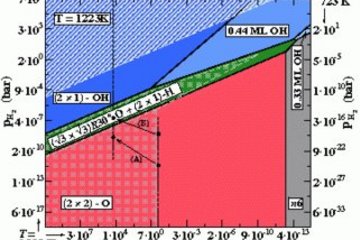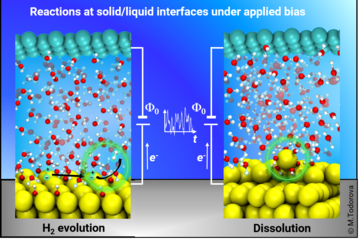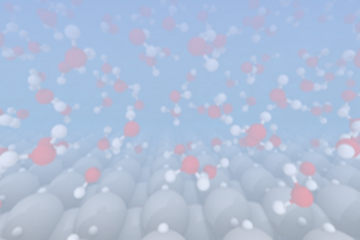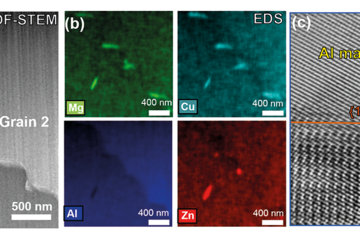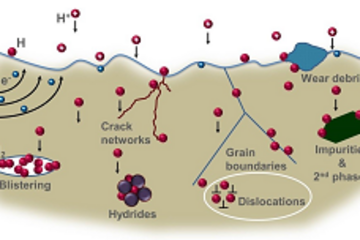All genres
501.
Poster
The Effective Surface pH during Reactions at the Solid/Liquid Interface. 63rd Annual Meeting of the International Society of Electrochemistry, Prague, Czech Republic (2011)
502.
Poster
Possibilities for high-temperature corrosion at MPIE. International Symposium on High-temperature Oxidation and Corrosion, Zushi, Japan (2010)
503.
Poster
Incoporation of functionalized Silica Nanoparticles into metallic matrices. CUSO – Summer School: Nanoelectrochemistry, Villars, Switzerland (2010)
504.
Poster
Novel Setup for Metal/Gas Reactions at High Temperature. 6th International Conference on Diffusion in Solids and Liquids: Mass Transfer, Heat Transfer and Microstructure and Properties, Paris, France (2010)
505.
Poster
Novel setups pushing the limits of high-temperature reaction studies. Gordon Research Conference on High Temperature Corrosion, New London, NH, USA (2010)
506.
Poster
Thermodynamic Simulations of Gas-Nitriding in Iron-Chromium and Iron-Silicon Alloys. European Conference “Nitriding and Nitrocarburising”, Aachen, Germany (2010)
507.
Poster
Analysis of model interfaces for Li ion batteries. DPG Spring Meeting 2010, Regensburg, Germany (2010)
508.
Poster
Scanning Kelvin Probe (SKP) as a tool for monitoring ion mobility on insulators. M2i Conference 2009, Noordwijkerhout, The Netherlands (2009)
509.
Poster
Reaction and Diffusion Phenomena in Technical Steel Samples. COMSOL Conference 2009, Milano, Italy (2009)
510.
Poster
Screening effects in probing the double layer by scanning electrochemical potential microscopy. Comsol European Conference October 2009, Milan, Italy (2009)
511.
Poster
A New Approach to Determine Ion Mobility Coefficients for Delamination Scenarios. ECASIA´09, Antalya, Turkey (2009)
512.
Poster
Numerical Simulation of High Temperature Corrosion Processes in Mn, Cr, Si, Al–Steels. Thermodynamics 2009, Imperial College London, U. K. (2009)
513.
Poster
Grain Boundary Oxidation at High Temperatures in Alloyed Steel Samples. Electrochem09 and 50th Corrosion Science Symposium, Manchester, UK (2009)
514.
Poster
Application of Atomic Force Microscopy in its Kelvin Probe Mode (SKPFM) over Filiform Corrosion of Aluminum Alloys. Workshop on Scanning Probe Microscopies and Organic Materials XVII, Bremen, Germany (2009)
515.
Poster
Novel Scanning Kelvin Probe for Integration into Synchrotron Beamline. 1st EIROforum School on Instrumentation, Geneva, Switzerland (2009)
516.
Poster
Microstructural and Surface Potential Study of Al–4 wt% Cu–Mg (DURAL) Alloy. ICAA 11, 11th International Conference on Aluminium Alloys, Aachen, Germany (2008)
517.
Poster
Fundamental Investigations of the Corrosion of Binary Alloys. 59th Annual Meeting of the International Society of Electrochemistry, Sevilla, Spain (2008)
518.
Poster
Zn–Mg–Al alloy electrodeposition from ionic liquids. 59th Annual Meeting of the International Society of Electrochemistry, Sevilla, Spain (2008)
519.
Poster
Role of Locallized Protection for the Performance of Conducting Polymer Based Composite Coatings. The 7th International Symposium on Electrochemical Micro and Nanosystem Technologies (EMNT 08), Kibbutz Ein Gedi, Israel (2008)
520.
Poster
FEM Simulation of the Scanning Electrochemical Potential Microscopy (SECPM). 2nd IMPRS-SurMat Workshop in Surface and Interface Engineering in Advanced Materials, Ruhr-Universität Bochum, Bochum, Germany (2008)




